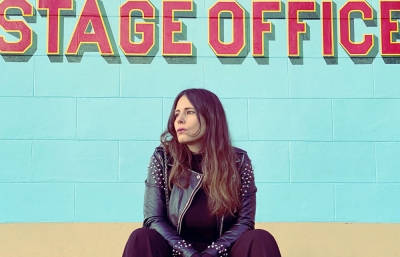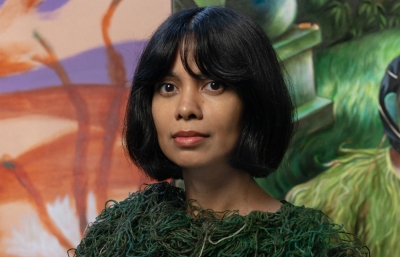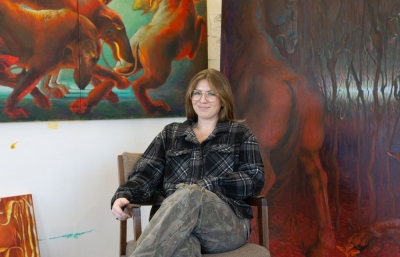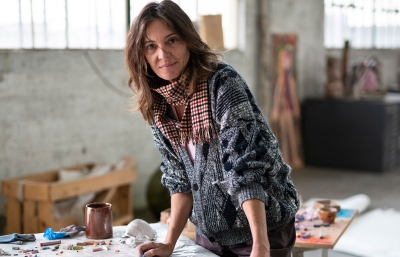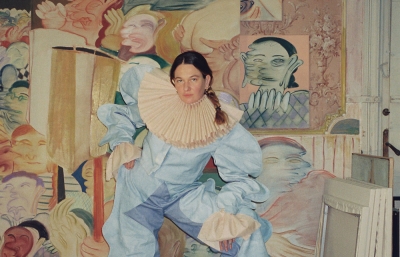Felipe Pantone
The Future We Are Waiting For
Interview by Doug Gillen // Portrait by Felipe Pantone Studio

Sometimes the art world bears the regrettable reputation for being averse to new technology, and the ongoing conversation about building bridges between creativity in the tech world and traditional studio practices can be bumpy. An acrylic or oil painting is familiar, accessible, so... copacetic. As social and digital media slowly change, the artistic comfort zone, it’s refreshing to talk positively about tech’s role, and Valencia, Spain-based artist Felipe Pantone is excited about the future, enthralled by how technology can expand his production, hungry to take Op art and Kinetic art methods and turn them into twenty-first century foundational art forms.
On the eve of a major solo show in NYC potentially on view this summer, and following a standout exhibition in Mexico City during their Winter Art Week, Radio Juxtapoz co-host Doug Gillen visited Pantone’s massive laboratory of experimentation, a studio brimming with new tools and infinite possibility, and perhaps the answers to how we will experience and view art in a world dramatically changed in 2020.

Doug Gillen: I came to Valencia a few years ago in the middle of the big festival you guys have here, the Falles, and there were so many people in the streets. This is probably a better chance to enjoy the city’s everyday charm.
Felipe Pantone: A little bit quieter, I'd say, but yeah, Valencia's nice. You've been here, so you know it's not pretentious. I like that. It's a very chill place, a great place as a base. Not a lot happens, but then you get to travel and that's good. The airport is fifteen minutes away from home.
When your life on the road is so hectic, I think it must be nice to return to this tranquility.
I need to live in a city because we actually produce things here that are not that easy to make. I need supplies, so I need to be in an industrial area; of course, it's not the forest, but it's quiet at the same time.
I know you moved from Argentina, but have spent most of your time here in Valencia. If I ask where you consider home, can you attach it to a place? Or, for that matter, to a person, or even an object?
Yes, I'd say maybe Valencia is the most similar thing to home, really. I feel good every time I come back. It’s true that it feels great. Every time I am ending a trip and heading to the airport, I feel I am always like, "Yeah." So, I guess that must mean it's home. At the same time, I'm very used to being in different places, so I’m good anywhere.
I'm never really homesick, ever. I'm very comfortable in any country, really. I guess that has a lot to do with my mom. When I was a kid, my parents weren't doing great, so that’s why we moved the first time, and actually, changed countries. I remember, until I was 10 or 12, we changed schools about 15 times, I think. It was crazy. We would constantly change neighborhoods because we couldn't pay rent, and my mom used to say, "This is great for you. It's going to be great for your personality." And I was like, "I want to make friends. Can we just fucking stop somewhere?" But I guess, in a way, it turned out to make sense.
Do you have any memories of those days in Argentina? Was there political turmoil at that time?
Argentina's a mess. It's a beautiful country with beautiful people—but a horrible government. It's crazy. Right now, they're in the same shit as 25 years ago. It's always the same. It's gorgeous, so rich in natural resources and so much culturally. And actually, the people are very educated. But I don't know. It's Latin America. It's a mess. So, yeah, I have good memories, but it’s complicated. I also moved when I was very young.

What pulled you into graffitti at such a young age?
When we moved here, we moved to Alicante, which is two hours south of Valencia. There’s a little town around Alicante where there's loads of graffiti. I was definitely rebellious back then. I was around 12 and would hide my paint; that wasn't good. Since I was a little kid, I always used to draw. But thinking right now, I remember that my cousin, for example, he never had things he liked to do, like, he didn’t like drawing. But he would paint graffiti. So, it was more something in my neighborhood that older kids would do. We played football, and then just did graffiti. There were older kids that did it, so we would, too. But I’d say I always liked to draw and everything. I was really into it. I did a demo, a rap demo when I was a kid, too. And then we used to break dance.
Do you remember the first time that you painted? How do you recall that experience?
Of course, of course. Listen, my first tag, listen to this, I'm very proud of this: my first name was “Cadillac.” How good is that? How many letters? Insane, insane.
One of the things I've heard in previous interviews is that graffiti is very much a game for you. Do you think people, probably myself included, as part of that outsider world, have a tendency to complicate things and over-attach meaning and symbolism to something that just doesn't need all that analysis? It's probably pretty simple.
Absolutely. Of course, it has legs. I was a leg myself. I was doing graffiti, and then in graffiti, I found a way to be very visible, meaning that, for example, black-and-white style—actually, all this black-and-white contrast, all these vivid colors, was a way for me to be like, “Yo, I'm here.” It's maybe louder than the guy painting next to me because it's super contrasted and very saturated, but that's how I found my current style.
That’s quite well documented and quite apparent, visually, and also has a huge connection to Kinetic and Op art. Aside from this style, is there a period in history that particularly fascinates you?
I'm very drawn to everything that's really, really refractive, so I would say the avant garde and onwards. I'd been doing Velasquez shit for all my studies, and even though I like figurative painting and all, it's not for me. I think that's been investigated so much that I don't have anything to contribute in that regard. It’s definitely helped me, but I'm definitely not interested.
How long before you realized that?
I don't know. I always knew. I was happy to try it, but I think there's so much more to investigate these days, so many technologies to apply, but that's just my personal opinion. So yeah, everything that's avant garde; but if you’re asking what I'm interested in nowadays, if I could collect work, it would be minimalism. It would be artists making work now. I’ve always gravitated towards geometric and abstract, as well as digital art.

You obviously go to a lot of shows and you have said that you definitely pick up little techniques and ideas, that you cherry-pick things. Do you find yourself constantly engaged with the art world, and what kind of things do you like to explore as a viewer?
As an artist, it's super important to stay updated on what's going on, especially if you're going to contribute to it. I’d say I see art history like a timeline. Like science, after penicillin was discovered, you want to move to something else like cancer. Don't go back to penicillin. We got it.
Got it. It's good. It's safe, it's in the bank.
At the end of the day, we're trying to find ways to express things. You want to read up on everything that's not the most important, make the rest simple, and make it go straight to the point. It's always good to visit these places, to find ways, to find how other people do it, or how you can tell that story.
That’s compelling, your idea about constantly moving forward, and I see it with the way you explore new mediums and other dimensions in how you can engage with your practice. With that, there's obviously the ephemeral nature of graffiti. Street art, it comes and it goes and is part of the timeline. You talk about that, though it doesn’t seem to apply to your canvases. They’re painted, or maybe done in another medium, which is fixed, permanent. It doesn’t possess the ephemeral nature, that journey. Does that feel against the grain for you in any way? Or does it not bother you?
No, no, no. I think it fixes a moment in time. I'm not planning to do the same painting over and over, but I'm happy I did that one painting. So, I'm happy that it stays there because it’s marking a moment, and again, I'm definitely trying to move forward, to keep working.
Actually, I think that's what fun about, well, I'd say generally about everything in life. I don't want to stay in the same place forever. I don't want to retire at the same factory forever. I want to live, and I want to work, and I want to keep having fun on that path, and I think that's how I see art or my journey.
I enjoy very much being really productive because I think that makes my journey more faceted. It’s not like I’m making a comparison, but when I consider Picasso, for example, that's insane. That guy lived, he achieved a lifetime worth five lifetimes, probably because he was so prolific. He changed so much from when he started doing very classic, academic figuration, and then he ended up doing Cubism, exploring everything, it was just crazy. And that's because he kept moving forward.
For me, that's a really good way of looking at things, and I'm going to try, of course. When it gets comfortable, my galleries will ask for the same one painting they want sold. They're like, "Can you make fifteen more of those?" So my response is, "How about this guy?" How about yeah, I’m trying something different. I think it's what makes it fun.

Without sounding like a really old man, do you think this relationship with technology, and especially digital media, is going to permanently change the way that we experience art? As someone more immersed in this than most of the population, what shape do you see it taking?
I think technology's always been very connected to art. For example, during the early Middle Ages, one of the darkest times in history, when tempera was used, it was followed by oil paint in the Renaissance, which is the result of great technology. I think, nowadays, I don't see myself as using fifteenth-century technology to paint my work.
I have to use whatever is available in my times. That's how I feel. And yeah, this is the most exciting time ever. Every five minutes there’s a new technology. Of course, I haven't tried them all, but I'm very open, that's for sure. I'm super open to try anything, whether I'm using printers or something else. I try things in VR, AR, projection mapping, whatever; but I think what's coming, we can't even imagine. That's how exciting these times are.
Honestly, I think we're going to be making new kinds of art that we can't even dream of at the moment. Same way we're going to have flying cars that are unimaginable. That's how it's evolving.
I really like your excitement for the future.
Oh, for sure man. Are you not excited? Look at all those fucking cables that you have around you. That's not going to be here. It's going to be way sleeker and nice. How can I not be excited about the future?
On the subject of your really moving, playful sculptures, do you feel something differently about them than your digital products? Do you have an inherent attraction to something that's analog? It's made with bearings. It's something robust that you can play and move and pick and pull. Is this something intrinsic in you?
This is something that is obviously influenced by Kinetic art that was really being explored in the 1960s, but it applies very much to today. Like I said, change and transformation is something really characteristic of our times. I think insurrection is an insane characteristic of our times.
Nowadays, everything is interactive. Everything goes in every direction. You can edit your own Wikipedia page! I think it's very interesting, as a spectator, for the art to be transformable, for you as a viewer to be able to reposition and actually recreate it. Maybe it’s all recreational these days.

Talk to me about the future, your outlook for what’s ahead.
Hold my hands. Close your eyes… so, what's coming up next? Well, I'm working on a big show in New York City, and that's going to be a big one. It’s supposed to happen in late June, so that's my main focus right now. I also have a bunch of side projects involving brands.
Is there a particular project or space you'd like to explore that you haven't yet?
Do you know this company, Take on Gravity, from the UK? It's this company that invented these propulsors where you can fly like airmen. That, I'm very interested in, if you guys are reading. No, honestly, how crazy is that? I think they crossed all the way to France on one of those. I think the future is bringing some things we can't even imagine, and honestly, it's going so fast that we're going to see everything. By the time you and I are 80, this is going to be a different planet. It's insane.
If there's one artist I can picture collaborating with an Iron Man jet pack, I think it's you.
I'd love that too, please!
@felipepantone

